Clinic aids long COVID sufferers
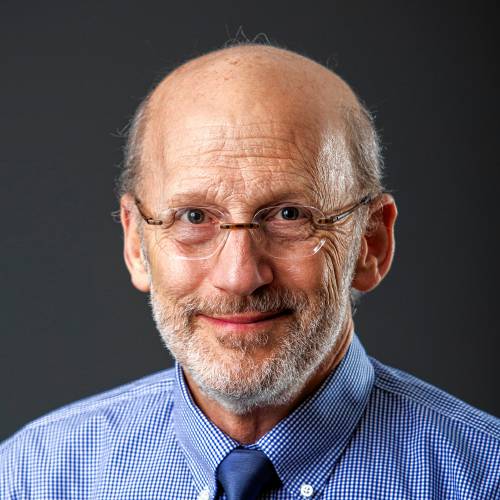
Jeffrey Parsonnet (Dartmouth Health photograph) Name hereMark Washburn—All Rights Reserved /...
|
Published: 12-06-2023 3:39 AM
Modified: 12-06-2023 1:04 PM |
PLAINFIELD — One day in this past May, Susan Kahn, a 77-year-old Plainfield resident, was unable to get up.
Her husband, Chris Rollins, called 911. She was unconscious with heart palpitations and says there were no Upper Valley cardiologists available to see her, so she was airlifted to Portsmouth (N.H.) Regional Hospital. Once there, she tested positive for COVID-19.
“I had no symptoms,” she said in an interview via Zoom from her home last month of the period just before her hospitalization. “It happened very suddenly. I could have died very easily.”
After four days in the hospital, she was recovered enough to check herself out. Months later, she continues to suffer from cognitive problems and fatigue.
“The worst thing for me was I had to give (up) my therapy practice,” she said. “It’s OK to retire when you’re 77 years old (but) it wasn’t planned.”
While the COVID-19 pandemic emergency is over, many people continue to contract the disease, and some find that symptoms, sometimes debilitating, linger long after the initial infection. The syndrome appears similar to myalgic encephalomyelitis, or chronic fatigue syndrome, ME/CFS, a condition for which patients and advocates have been seeking better treatment for years.
A clinic at Dartmouth Hitchcock Medical Center in Lebanon offers patients support and some help managing symptoms, but there is still no cure.
In addition to the brain fog, fatigue and heart palpitations Kahn has experienced, other post-COVID symptoms can include anxiety, cough or shortness of breath upon exertion, head and body aches, and insomnia.
Article continues after...
Yesterday's Most Read Articles
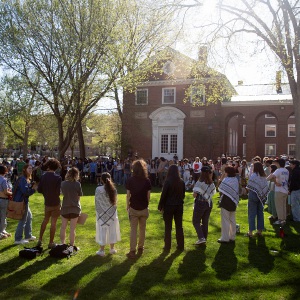 Dartmouth administration faces fierce criticism over protest arrests
Dartmouth administration faces fierce criticism over protest arrests
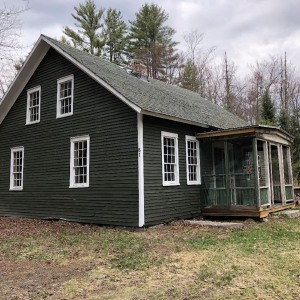 Hanover house added to New Hampshire Register of Historic Places
Hanover house added to New Hampshire Register of Historic Places
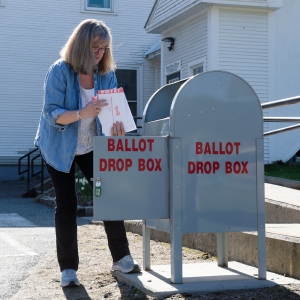 Sharon voters turn back proposal to renovate school
Sharon voters turn back proposal to renovate school
In the two and a half years since the clinic was established, it’s gotten 1,725 referrals, Dr. Jeffrey Parsonnet, the infectious disease specialist who runs the post-acute COVID syndrome, PACS, clinic, said in a phone interview last month. The providers have seen about half of those who have been referred. In some cases, patients don’t meet the clinic’s criteria, which require that patients be at least 18 and have had post-COVID symptoms for 12 weeks or more following a COVID infection.
While rates of referrals have varied, Parsonnet said the clinic receives an average of 50 to 60 new referrals each month.
There are various theories about long COVID, Parsonnet said. One is that there is some sort of dysfunction of the autonomic nervous system, which controls digestion, circulation and breathing. There’s also data that shows that patients with long COVID have low serotonin levels and low levels of cortisol. Another theory suggests that the symptoms may be due to micro-clots in blood vessels.
But there is not yet enough information to support broad therapies based on these theories, he said. At the clinic, Parsonnet or another infectious disease specialist spends an hour with each patient.
“We listen to the patient and educate them,” he said. “Patients often say at the end of the hour, (you’re the) first person to really listen to me. Most doctors are just so dismissive of my symptoms.”
Parsonnet said that most doctors’ visits are short and “these patients are complicated.”
There’s no diagnostic test for long COVID. Most tests come back normal, leaving doctors without a clear path forward. In some cases, doctors “kind of blow them off,” Parsonnet said. That leaves patients feeling “dismissed, isolated, stigmatized,” he said.
“One of the things that we offer in the clinic is a good listening ear,” Parsonnet said.
Physical therapy, from a provider familiar with long COVID, can help some patients, he said, as can medication. Occupational therapists can help people navigate their brain fog, Parsonnet said.
“Cognitive rehabilitation doesn’t necessarily make it better (but it) allows people to function better,” he said.
For most patients, the symptoms are temporary.
“Most patients do get better over time,” he said.
Some patients experiencing insomnia can benefit from support from the sleep disorders clinic, while others benefit from pain medications, he said.
What don’t seem to help are a lot of diagnostic tests, he said, since they often come back negative, or in a normal range.
Parsonnet warns against treatments based on studies with very small sample sizes, but acknowledged that patients are frustrated. The impacts, he noted, are significant, with estimates of tens of millions of people suffering from the condition, roughly half of them unable to work or forced to cut back their hours.
He described it as a “hidden but very significant drain on productivity and employment in general.”
The impacts are hidden because people acutely sick with COVID-19 are no longer filling hospitals, he said.
He continues to recommend prevention as the best way to avoid long COVID and vaccines as the best way to prevent COVID. That said, he noted, many people with long COVID have been vaccinated. There also is some debate about whether the drug Paxlovid, used to reduce the severity of COVID-19 symptoms, also can reduce the risk of long COVID, he said.
It can be difficult to predict who will get long COVID. Fewer than 10% of the patients Parsonnet sees in his clinic were initially sick enough with the virus that they had to be hospitalized.
“We really don’t understand it,” he said.
Treating patients with COVID-19 is not income-generating for the hospital, he said. In the time it takes for him to see one patient, another provider could do three colonoscopies, for example, he said.
“This kind of patient care is not adequately reimbursed,” he said. “It’s been difficult for us as a team to put together.”
He noted that the team lacks a social worker and a dietitian. In addition to infectious disease specialists such as himself, the team includes neurologists, a pulmonologist, a family medicine physician, a cardiologist and psychiatrists, according to the DH website.
It’s a “source of frustration for us that we can’t offer a full array of services,” he said.
He noted that the clinic is not advertising its services. While they want to help people who need support, “third-party reimbursement for this kind of services is difficult in our health care system,” he said, noting that primary care is reimbursed at a lower rate than specialty care.
“We have trouble keeping up with the demand for our services,” he said.
In spite of the challenges still facing long COVID treatment, Peg Keeler, a 72-year-old retired physical education teacher who lives in New London, is hopeful that the attention on the condition might help patients such as her husband, Jody, who suffers from ME/CFS, which began following an infection in 2011.
In 2011, Keeler was still working and she brought home some sort of virus, which she passed to Jody. He developed bronchitis and “never really got over it,” Peg Keeler said in a phone interview last month.
Jody, now 74, continued working as a commercial real estate broker for about a year after his initial illness until he finally told his wife “he couldn’t do it anymore,” she said.
While Jody loved his job and making deals with people, he could no longer spend the required time on the phone.
Initially, Peg Keeler said she had trouble accepting her husband’s condition. They went to doctors as far away as Boston and New York State. At first Peg Keeler kept working and on work days, she would leave her husband in bed with a level 10 headache that no medication would touch.
“No one had any suggestions,” she said. The doctors they saw would “pass the buck,” she said.
The Keelers learned through a friend about myalgic encephalomyelitis, or chronic fatigue syndrome, and “Jody was left educating this doctor,” Peg Keeler said.
Meanwhile, she said it’s “taken me a long time to accept the fact that this is how life is going to be.”
They don’t go out at night. Her husband’s social circle is now limited to people he can communicate with via email. He sees two friends he used to play guitar with once every three or four months for a few hours.
His illness comes in cycles every four or five weeks, Keeler said. On his good days he can do woodworking or play guitar, but conversations are very stressful and result in headaches. As a result, Peg Keeler said she’s modified the way she speaks and picks moments when he’s feeling well to ask important questions.
“Sometimes it’s like walking on eggshells,” she said.
He’s found some benefit from a low dose of an opioid painkiller, she said. But “sometimes it just doesn’t touch it.”
Peg Keeler was among a group of advocates from the #MEAction New Hampshire Chapter who organized an event at DHMC last month, “The Untreated Epidemic: Understanding and Treating Long COVID and ME/CFS.”
Keeler said some 500 people registered for the event, which was held both in person and online.
“I think long COVID, as much as I hate to see people get sick with it, has really been a bonus for ME people,” she said.
Parsonnet also said he sees a connection between long COVID and ME/CFS. He said roughly half of the patients he sees also meet the criteria for ME/CFS. He sees “tremendous overlap” between the two conditions.
They also are similar in that the mechanisms causing the symptoms are poorly understood.
“I have a new respect for ME/CFS,” he said. “It’s opened my own eyes as to the severity of that illness.”
Kahn sought support from the DHMC long COVID clinic. She said it took two months to hear from Dr. Parsonnet. But when she did he was compassionate.
“Jeffrey Parsonnet said to me a number of times ‘It will get better,’ ” she said. She’s grateful the clinic exists and said that it has helped her to feel less alone in her illness.
Kahn is forgetful and has trouble recalling the names of people she sees regularly, but she feels her cognition is improving. She’s also fatigued and said she would otherwise have been napping during the time last month she spoke with a reporter via Zoom. While she was initially very depressed, now “I’m a little bit more hopeful.”
She’s started a writing group for people living with chronic illness. It’s a group of six people that meets once a week.
“That’s helped me a lot just to have that support,” she said.
Nora Doyle-Burr can be reached at ndoyleburr@vnews.com or 603-727-3213.

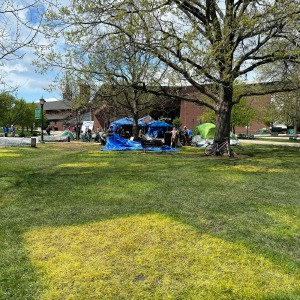 Students take down pro-Palestinian encampment at UVM
Students take down pro-Palestinian encampment at UVM
